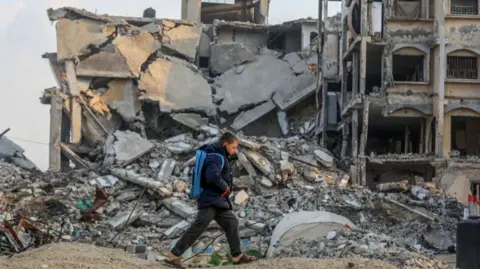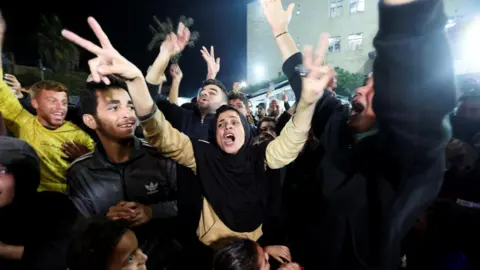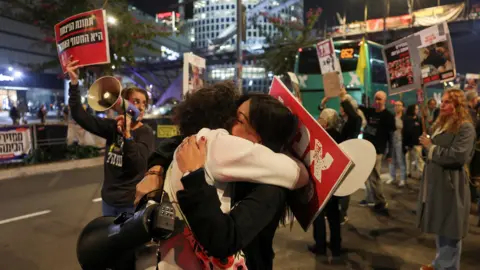The Gaza ceasefire agreement agreed by Israel and Hamas, Qatar and the US said

Israel and Hamas have agreed to a ceasefire in Gaza after 15 months of war, Qatari and US mediators said.
Qatar’s Prime Minister Sheikh Mohammed bin Abdul Rahman Al Thani said the agreement will come into force on Sunday as long as it is approved by the Israeli cabinet.
US President Joe Biden said he would “stop the fighting in Gaza, provide much needed aid to the Palestinian people, and reunite the hostages with their families”.
Israeli Prime Minister Benjamin Netanyahu said the final details of the deal were still being worked out, but thanked Biden for “encouraging” it. Hamas leader Khalil al-Hayya said this was the result of the “firmness” of Palestine.
Many Palestinians and families of Israeli hostages celebrated the news, but there was no end to the war in Gaza.
The Hamas-run Civil Defense agency reported that Israeli strikes killed more than 20 people following the Qatari announcement. They include 12 people living in the Sheikh Radwan neighborhood of Gaza City, it said. There was no immediate comment from the Israeli military.
Israel launched a campaign to destroy Hamas – described as a terrorist organization by Israel, the US and others – in response to an unprecedented cross-border attack on 7 October 2023, in which around 1,200 people were killed and 251 others were captured. .
More than 46,700 people have been killed in Gaza since then, according to the Hamas-run health ministry in the area. Most of the 2.3 million people have also been displaced, there is widespread destruction, and there are severe shortages of food, fuel, medicine and shelter due to the struggle to get aid to those who need it.
Israel says 94 hostages are still being held by Hamas, 34 of whom are believed to have died. In addition, there are four Israelis who were captured before the war, two of whom died.
Qatar’s prime minister called for “calm” on both sides ahead of the start of the first six-week phase of the ceasefire, which he said would see 33 hostages – including women, children and the elderly – exchanged for Palestinian prisoners in Israeli prisons.
Israeli forces will also withdraw eastward away from the most populated areas of Gaza, displaced Palestinians will be allowed to begin returning to their homes and hundreds of aid trucks will be allowed into the area each day.
The second phase of talks – which should see the release of remaining hostages, the full withdrawal of Israeli forces and a return to “sustainable calm” – will begin on the 16th.
The third and final phase will involve the reconstruction of Gaza – something that could take years – and the return of any remaining bodies of hostages.
Sheikh Mohammed said “there is a clear way to negotiate the second and third phase”, with the agreements to be published “in the next few days, once the details are finalised”.
He also said that Qatar, the US and Egypt, which also helped negotiate the agreement, will work together to ensure that Israel and Hamas fulfill their obligations.
“We hope that this will be the last page of the war, and we hope that all parties will commit to implementing all the terms of this agreement,” he added.
 Getty Images
Getty ImagesPresident Biden said that this program, which he explained for the first time eight months ago, “was not only the result of the great pressure that Hamas has been under and the change in regional statistics after the end of the conflict in Lebanon and the weakening of Iran – but also difficult and difficult problems. American diplomacy”.
“While we welcome this news, we remember all the families whose relatives were killed during the Hamas attack on October 7, and the many innocent people who were killed in the ensuing war,” the statement said. “It is past time for the fighting to end and the work of building peace and security to begin.”
At a recent news conference, Biden also agreed to help President-elect Donald Trump, who has put pressure on both parties by demanding the release of hostages before his inauguration on Monday.
“For the past few days, we have been talking as one group,” he said, noting that the implementation of the agreement will take place after he leaves office.
Trump was the first to confirm reports that a deal had been reached, hitting the White House and Qatar with an official announcement.
In a recent post on social media, he tried to take credit for the “historic” deal, saying “it was only possible because of our historic victory in November”.
The office of Israeli Prime Minister Benjamin Netanyahu thanked Trump “for his help in promoting the release of the hostages, and for helping Israel end the suffering of many hostages and their families”.
“The prime minister has made it clear that he is willing to bring back all the hostages by any means,” he said, before adding that he thanked Biden as well.
Later, the office said that an official statement from Netanyahu “will only be issued after finalizing the final details of the agreement, which is currently being worked on”.
Israel’s President, Isaac Herzog, said the deal would bring “very painful” times and “present challenges”, but it was “the right step”.
The deal is expected to be approved by the Israeli cabinet, possibly as early as Thursday morning, despite opposition from Netanyahu’s coalition partners.
After that the names of all Palestinian prisoners to be released will be made public by the Israeli government, and the families of any victims will be given 48 hours to appeal. Some of the prisoners are serving life sentences after being convicted of murder and terrorism.
Hamas’s chief negotiator and acting head of Gaza, Khalil al-Hayya, said the deal represented “a milestone in the confrontation with the enemy, on the way to achieving our people’s goals of freedom and return”.
The group, he added, will now seek to “rebuild Gaza again, to ease the pain, to heal the wounds”.
But he also warned that “we will not forget, and we will not forgive” the suffering faced by the Palestinians in Gaza.
 Reuters
ReutersAs news of the deal emerged, images showed people cheering and waving Palestinian flags in the central Gaza city of Deir al-Balah and the southern city of Khan Younis.
Sanabel, a 17-year-old girl who lives in northern Gaza City, told BBC OS: “We are all happy.”
“We have been waiting for this for a long time,” he said. “Finally, I’ll lay my head on my pillow without worry… It’s time to recover.”
Nawara al-Najjar, whose husband was among more than 70 people killed when Israeli forces launched an operation to rescue two hostages, said: “After the weapons are gone I want to give my children the best life possible.”
“I want them to end the fear we were living with. My children are really scared. Fear has settled in their hearts.”
 Reuters
ReutersSharon Lifschitz is a British-Israeli woman whose 84-year-old father Oded is among the remaining hostages. His mother, Yocheved, was also captured in the October 7 attack but was released after several weeks of detention.
He told the BBC in London as news of the deal emerged that it sounded “preposterous”, but admitted: “I know the chances of being a father are very slim.”
“He is old but miracles do happen. My mother came back, somehow we will know. We will know that she is still with us, if we look at her.”
He warned: “Many graves will come and torture people to come back, but we will look after them and make them see the light again… May this be the beginning of something better.”
Moshe Lavi, the brother-in-law of Omri Miran, 47, a father of two, told the BBC it was “a very mixed day for many of the families of the hostages”.
“We want to see our families return from captivity in large numbers. But we also understand that this is a phased agreement. It is only the first phase that was agreed upon,” he said.
“We will have to continue to fight, we will continue to plead as families with all the leaders of our government so that they understand that they must release all the hostages.”
UN Secretary-General Antonio Guterres said “the priority now must be to alleviate the enormous suffering caused by this conflict”.
Source link




